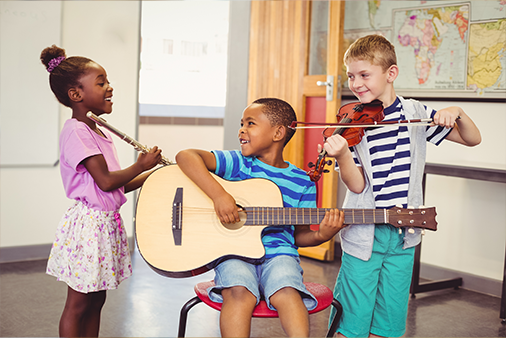Music Lessons Foster Self-Esteem in Children and Adolescents
Oct 13, 2023

When the giggles and carefree joys of early childhood give way to the stress and peer pressures of the preteen and adolescent years, it’s important to encourage young people to believe in themselves and keep trying new things.
Children and adolescents face various challenges to their self-esteem, and learning to play a musical instrument can be an avenue to positive self-awareness. The journey of mastering an instrument not only cultivates a love for music but also instills a sense of accomplishment, resilience and confidence in a young person.
Learning to play a musical instrument requires dedication, practice and perseverance. A young music student grows in self-esteem when he or she makes incremental improvements, such as mastering a new chord or playing a complex piece. This newfound confidence extends beyond the realm of music, empowering young individuals to tackle challenges in other aspects of their lives with a positive mindset.
Self-Expression at a Time in Life Where Doing So Can be Difficult
Music provides a unique platform for self-expression. Through playing an instrument, young individuals can channel their emotions and creativity, allowing them to communicate in ways that words alone often cannot capture. This ability to express oneself through music fosters a sense of self-identity, enabling children and adolescents to explore and discover their unique talents, strengths and preferences. As they develop their musical skills, they gain a deeper understanding of who they are and build a stronger foundation for self-esteem.
Learning an instrument is marked by numerous milestones, such as performing in recitals, participating in competitions or playing in a school band. Each accomplishment reinforces a sense of achievement, providing tangible evidence of progress and growth. These achievements, both big and small, contribute to a young individual's self-esteem by validating their efforts and dedication. The recognition and encouragement received from peers, teachers and family members further enhances a young person’s confidence and self-worth.
Problem-Solving Skills They’ll Need in Adulthood
Music lessons teach young people the value of resilience and perseverance. Learning an instrument can be challenging, but as students encounter obstacles, they learn to persist, adapt and problem solve. The ability to navigate through setbacks and emerge with newfound strengths cultivates a resilient mindset that extends beyond music, equipping them with the tools to face future challenges with confidence.
Learning to Work with Others
Participating in music lessons often involves ensemble performances, group practices, or even joining bands or orchestras. Engaging in collaborative musical experiences provides children and adolescents with opportunities to develop social skills and build meaningful connections with their peers. Working together towards a common goal, such as performing a piece of music, fosters teamwork, empathy and effective communication. These interpersonal skills not only enhance a student’s musical experience but also positively affect their self-esteem by fostering a sense of belonging and accomplishment within a supportive community.
Learning to play a musical instrument offers children and adolescents a transformative path to self-discovery, confidence and resilience. The journey of mastering an instrument through music lessons instills a sense of accomplishment, fosters self-expression, and develops important life skills. As young individuals navigate the challenges of learning an instrument, they not only cultivate a passion for music but also build a strong foundation of self-esteem that positively influences various aspects of their lives.

